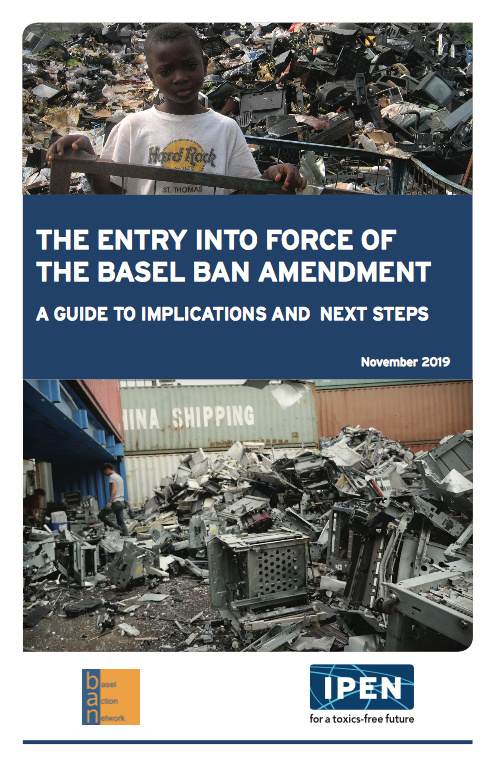BASEL CONVENTION
After several toxic trade disasters in the 1970s and 1980s, the international community came together to reject the free trade of hazardous wastes. Under the United Nations Environmental Program (UNEP) the Basel Convention on the Control of Transboundary Movements of Hazardous Wastes and Their Disposal was adopted in 1989. The treaty aims at protecting especially developing countries from the dumping of toxics and requires that countries “take all practicable steps” to ensure the environmentally sound management and disposal of hazardous wastes. Combating unrestricted toxic trade, the treaty promotes national self-sufficiency in waste management, i.e. the minimisation of transboundary movements of hazardous wastes.
In 1995, a group of delegates from developing countries, who were disappointed with the lack of meaningful enforcement of the Basel Convention, created the Ban Amendment. The Ban Amendment prohibits the export of hazardous waste from more developed to less developed countries. The NGO Shipbreaking Platform’s member Basel Action Network (BAN) actively supports delegates from less developed countries in promoting the Ban Amendment, which entered into force at international level on 5 December 2019. At the European level, the Basel Convention, including the Ban Amendment, has been transposed into Union law by the European Union Waste Shipment Regulation (EU WSR). Export of hazardous waste from the EU to developing countries is thus prohibited.
The Basel Convention defines end-of-life ships as hazardous waste because of their toxic components, such as asbestos, lead and mercury. In 2002, the Basel Convention adopted Technical Guidelines for the Environmentally Sound Management (ESM) of the Full and Partial Dismantling of Ships, a document for countries that already have or are establishing ship dismantling facilities. The Guidelines provide recommendations on procedures, processes and practices that must be implemented to ensure safe and environmentally sound practices. The Guidelines also provide advice on monitoring and verification of environmental performance.
Although the Basel Convention is a huge win for environmental justice, there has been difficulty in applying its provisions to ships. Many European ships end up on the beaches of South Asia despite the Basel Convention, including the Ban Amendment, being applicable in the EU. Parties have recognised that Basel controls are in most cases circumvented for ships going for breaking. As a vessel becomes waste only when the intent to dispose of it is evident, it is sufficient for ship owners to hide their true intentions from local authorities. Indeed, shipping companies often falsely deny that ships are intended to be scrapped, and claim instead that the ship is heading towards repair yards, or has been sold for further operational use.
No attempt to enforce the Basel Convention on the basis of a ship’s beneficial ownership country has yet been made: a German-owned end-of-life vessel which is sold for breaking to a yard in a developing country will not be stopped on the basis that its owner is based in Germany, and thus that the commercial decision to scrap the ship has been taken by a German company. Instead, it is the state from where the vessel leaves once it has been sold for breaking, i.e. when it becomes a waste, that is the ‘exporting state’ responsible for enforcing the Convention. So, if the German ship is sold for breaking whilst in Singapore, Singapore is deemed responsible for the waste. As the intent to dispose the vessel is only in very rare cases disclosed by the owner to authorities, enforcement is made very difficult. Often the intent to scrap the ship is not known before the vessel has arrived its scrapping destination.
When the Basel Convention State Parties started discussing alternative and more appropriate interpretations of “exporting state” for ships – such as the flag state or the state where the beneficial owner of the ship is located – the International Maritime Organisation (IMO) was quick to declare that it would start working on a new legally binding convention specifically on ship recycling to be based on enforcement by the flag state and recycling state. As closing the Basel Convention loopholes for ships took a sidestep to the negotiations for a new convention at the IMO, so did the prospect of seeing beneficial owners of ships held responsible for sustainable ship recycling. In 2009, the IMO adopted the controversial Hong Kong Convention, which to date has not yet entered into force as it has been ratified by only six countries.
The Basel Convention thus still remains the only international law governing ship recycling. It is also likely to stay in force once the IMO’s Hong Kong Convention is applicable as Parties to the Basel Convention have not come to an agreement that the Hong Kong Convention provides and “equivalent level of protection” to the Basel Convention, a requirement that must be fulfilled for any new law to replace Basel competency.
The Basel Convention has also been at the crux of milestone decisions such as that 2009 High Court order in Bangladesh that closed the entire industry as it was not operating in line with existing national and international environmental laws. In Europe the exports of vessels to beaching yards been stopped based on the requirements of the EU WSR. Increased awareness of the murky business of toxic end-of-life ship trade have resulted in several ongoing investigations and in 2018 in the Netherlands a ship owner was for the first time held criminally liable for having intended to scrap four vessels on the beach in India.


